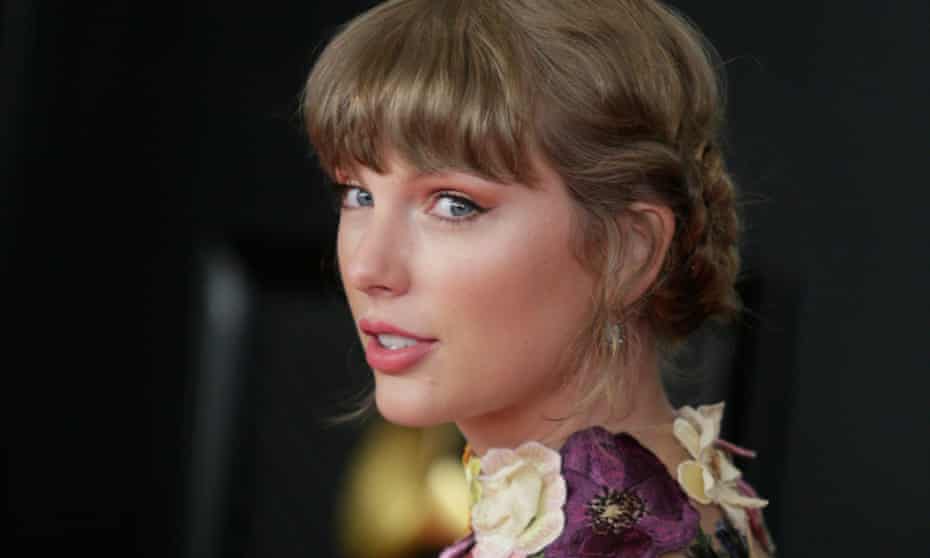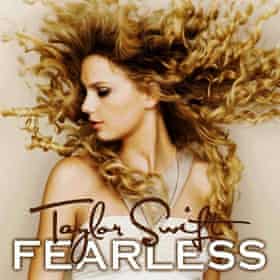(Republic) Since about 2018, Taylor Swift has been at the centre of arguably the most riveting contract dispute in music business history since Prince wrote “slave” on his cheek. It has been a conflict fought in public, in detail. No precis does the nuances justice, but the crux of Swift’s unhappiness is that the rights to her first six albums were sold out from under her nose when her former label, Big Machine, was acquired by a man she regards as an enemy: Scooter Braun. Braun is Justin Bieber’s manager; more pertinently, he also managed the rapper Kanye West at a time when West was tormenting Swift – another vexed tale wrapped around this one in a double helix. The antagonism between Swift and West began when he interrupted her acceptance speech for best female video at the VMAs in 2009. The video in question was You Belong With Me – a hit from Swift’s hugely successful 2008 album Fearless. That album has now been totally re-recorded by Swift and was released on Friday. Why? In November 2020, after months of hostilities exchanged via social media and the legal profession, Braun sold Swift’s catalogue on to a private equity firm, Shamrock Holdings. As part of the deal, Braun would continue to profit from the use of Swift’s early work on streaming platforms, radio, TV and adverts. Swift particularly objects to the fruits of her youthful labours going to a man she has accused of “incessant, manipulative bullying”, on whose watch West made a video creepily sexually objectifying her (other celebrities were also depicted). Swift’s radical solution is to make her first six albums worth significantly less by re-recording them, so that future uses favour her, not Shamrock or Braun. Hence Fearless (Taylor’s Version) – less an album and more a breathtaking chess move, the aural equivalent of pulling the rug out from under her antagonists. First released in 2008 – 13 years ago, a favourite number of Swift’s – Fearless was Swift’s second studio outing and first massive hit. By the time the album’s cycle had concluded, she had the bestselling album in the US and a slew of awards, including the Grammy for album of the year– she was the award’s youngest-ever recipient until Billie Eilish. It was a different world: when the album was released, Swift, just 18, had recently broken up with a Jonas Brother. Her songs were rooted in country, but the foundations of her pop auteurism were plain. The album’s overemphasis on romance was mitigated by Swift’s insightfulness, which only grew more acute with time. “When you’re 15, and somebody tells you they love you, you’re gonna believe them,” she sang ruefully on the autobiographical Fifteen, from the lofty vantage point of someone not yet of legal drinking age in the US. Swift’s signature ad libs were there too – the laugh on Hey Stephen – as were the killer bridges that hallmark so many of her best songs, riding on the thermal of a key change. All this is still present, and there’s more: six unreleased songs that date from the Fearless album sessions plus a re-recording of Today Was A Fairytale, a song she contributed to the soundtrack to the 2010 film Valentine’s Day. On Fearless (Taylor’s Version), Swift has radically recreated the 2008 cover shot. Its sepia tint, and the loose peasant blouse she is wearing, very much suggest the contemporary Swift of her soft-focus albums of 2020, Folklore and Evermore. But she has been at pains to reproduce her original country-pop as precisely as possible, the better to gazunder Shamrock Holdings. It’s a labour of revenge, but also of love: Swift has re-employed key contributors from the period and mixed them with members of her live band who played many of these songs live for years. Guests such as Keith Urban, who she toured with at the time, crop up on bonus tracks like That’s When. These unreleased vault tracks are something of a mixed bag. They’re intended as a sweetener – choice pickings from Swift’s rich vault of unreleased material – but she has carte blanche to present them as she pleases. They’ve ended up as sedate iterations, pairing the brighter, more direct songcraft of the younger Swift with the watercolour production of the Folklore era. There are exceptions: Mr Perfectly Fine can handle the pastels, it’s such a stone cold classic Swift song; You All Over Me is similarly rewarding, not least because it is an obvious precursor to 1989’s Clean. The core reproductions, however – of the 19 re-recorded tracks that formed the platinum version of Fearless – are a roaring success. The verisimilitude of the music is as near-as-dammit, although if you were trying to sell this as an art forgery, someone would eventually twig. The production can’t help but sound smoother, the quality of the playing more nuanced – witness the interplay between the guitar and banjo that opens the new version of the title track, or on one of the album’s biggest hits, You Belong With Me. What really stands out, though, are Swift’s vocals. She can’t reproduce her reedier, less skilful teenage self. She parcels out her tones more cannily now, an anachronism that is no criticism. But spending time with all this juvenilia only points up the quality of Swift’s songwriting. Fearless (Taylor’s Version) is both an art project executed serendipitously and a strategic move the industry will be poring over for some time. ... as you join us today from Hong Kong, we have a small favour to ask. Through these turbulent and challenging times, millions rely on the Guardian for independent journalism that stands for truth and integrity. Readers chose to support us financially more than 1.5 million times in 2020, joining existing supporters in 180 countries. With your help, we will continue to provide high-impact reporting that can counter misinformation and offer an authoritative, trustworthy source of news for everyone. With no shareholders or billionaire owner, we set our own agenda and provide truth-seeking journalism that’s free from commercial and political influence. When it’s never mattered more, we can investigate and challenge without fear or favour. Unlike many others, we have maintained our choice: to keep Guardian journalism open for all readers, regardless of where they live or what they can afford to pay. We do this because we believe in information equality, where everyone deserves to read accurate news and thoughtful analysis. Greater numbers of people are staying well-informed on world events, and being inspired to take meaningful action. We aim to offer readers a comprehensive, international perspective on critical events shaping our world – from the Black Lives Matter movement, to the new American administration, Brexit, and the world's slow emergence from a global pandemic. We are committed to upholding our reputation for urgent, powerful reporting on the climate emergency, and made the decision to reject advertising from fossil fuel companies, divest from the oil and gas industries, and set a course to achieve net zero emissions by 2030.Taylor Swift: Fearless (Taylor’s Version) review – a labour of revenge, but also of love
 ‘Less an album and more a breathtaking chess move’: Taylor Swift at last month’s Grammy Awards in Los Angeles. Photograph: CBS/Getty Images
‘Less an album and more a breathtaking chess move’: Taylor Swift at last month’s Grammy Awards in Los Angeles. Photograph: CBS/Getty Images
Painstakingly re-recording her breakthrough 2008 album to hit back at her music business enemies proves a fruitful endeavour for the songwriter

taylor
标签:
数学
上一篇:
批量点赞b站腾讯辣酱
下一篇:
李华巧大帅逼是谁









